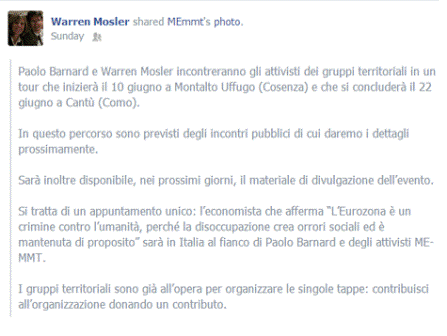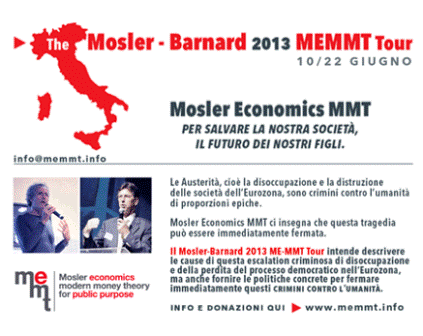You got the Russian trade dead wrong. Please file a correction.
I turned the firm over to my partners at the end of 1997, long before the Russian default, after a disagreement on how that fund was managed. With a fixed exchange rate there was a very real risk of default. As I told you my only contribution to the fund was the name which proved invaluable.
Also you should have asked me for a response to Thoma and real rates if you were going to publish his comments, as a matter of journalism. The only reason real rates can be a problem is if they limit credit expansion, in which case a tax cut or spending increase is in order to sustain output and employment.
Not that it matters, but history will not be kind to you regarding these points and the dismissive tone of your article in general.
By Annie Lowry
July 4 (NYT) — Warren Mosler is a card-carrying member of the 1 percent. A deeply tanned, tennis-lean hedge fund executive, Mr. Mosler lives on this run-down but jewel-toned Caribbean island for tax reasons. Transitioning into an active retirement, he recently designed and had built an $850,000 catamaran called Knot My Problem. He whizzes around St. Croix in a white, low-slung sports car he created himself, too.
But his prescriptions for economic policy make him sound like a warrior for the 99 percent. When the recession hit, Mr. Mosler said, the government should have spent and spent until unemployment came down to a comfortable level. Forget saving the banks through the Troubled Asset Relief Program. Washington should have eliminated the payroll tax, given every state $500 per resident and offered a basic job to anyone who wanted one.
“There would have been no recession,” Mr. Mosler, 63, said over a salad at a hole-in-the-wall seaside cafe called Rum Runners.
Washington’s debts would have soared, of course. But Mr. Mosler sees no problem with that. A failed Senate candidate in Connecticut with unorthodox but attention-grabbing economic theories, he says he believes the United States should be running much bigger deficits and that the last thing the government needs to worry about is balancing its budget.
Mr. Mosler’s ideas, which go under the label of “modern monetary theory,” or M.M.T., are clearly on the fringe, drawing skeptical reactions even from many liberal Keynesian economists who agree with some of his arguments. But they have attracted a growing following, flourishing on the Internet and in a handful of academic outposts, as he and others who share his thinking have made the case that austerity budgeting in the United States and in Europe is doing irreparable harm.
Like many Keynesian economists, Mr. Mosler and other modern monetary theorists are particularly disturbed by the longstanding campaign articulated and financed by Peter G. Peterson, a former commerce secretary who co-founded the Blackstone Group private equity fund, to reduce the deficit or else.
“There’s a whole deficit lobby of Peterson-funded groups arguing we’re turning into Greece,” said James K. Galbraith, an economist at the University of Texas at Austin. “They’re blowing smoke and the M.M.T. group has patiently explained why.”
Still, even for those with some knowledge of economics, the tenets of the modern monetary theory can make your head spin. The government does not tax its citizens to pay for federal spending. It taxes them to ensure they use the dollar and to help to regulate demand. Since the government prints the dollar, it can never run out of money and it need never balance its budget, not even to prevent the crowding out of private investment when the economy is humming along.
What about inflation? “What about it?” Mr. Mosler replied. “How can the United States have $16 trillion in debt and still be on the verge of deflation, even when Chairman Bernanke’s using every alphabet-soup trick in his book?”
To mainstream economists, Mr. Mosler and his adherents represent something of a counterpoint to the handful of academics on the right who believe the United States should return to the gold standard because the government is supposedly going bankrupt and the Federal Reserve under Ben S. Bernanke is debasing the currency.
“They deny the fact that the government use of real resources can drive the real interest rate up,” said Mark Thoma, an economics professor and widely followed blogger who teaches at the University of Oregon. After delving into the technical details of modern monetary theory for a few minutes, he paused, then added, “I think it’s just nuts.”
But just as a return to the gold standard has attracted a popular following — including many supporters of Ron Paul, the charismatic former Texas congressman — so has modern monetary theory, which has been spread on the great stage of the Web. A thriving academic blogosphere brings ideas up and knocks them down, and popular sites like Business Insider and Naked Capitalism have given modern monetary theorists a platform to join in.
“These ideas definitely aren’t disseminated through published academic journals,” said Stephanie Kelton, an economist at University of Missouri-Kansas City, who coined the term “deficit owls” to distinguish modern monetary theorists from “deficit hawks.” “It’s all on the Internet.”
Mr. Mosler has played a pivotal role in promoting the theory, and unlike many economists he has the resources to do so. He runs a popular blog called the Center of the Universe, a sly joke, perhaps, given that tiny, tropical St. Croix, which is about 1,200 miles from Miami, is the easternmost point in the United States. He eagerly appears on radio programs and on television. Recently, he went on a tour of Italy to promote his anti-austerity ideas.
He has also helped to build an infrastructure to mint new modern monetary theorists, helping to found the Center for Full Employment and Price Stability at the University of Missouri-Kansas City, and financing a small army of graduate students. “Someone once said that economics advances one funeral at a time,” Mr. Mosler said, chuckling. “The hope is that we have a generation of economists coming up who really understand how things work and can put those ideas to a public purpose.”
There were also a few self-financed political campaigns, including some fruitless races in the Virgin Islands. In his 2012 run, Mr. Mosler said he believed the voting was rigged. He made a vanity run for Senate in Connecticut in 2010 as an independent, making waves by offering to use $100 million of his own money to pay down the deficit if any member of Congress could prove that government spending was actually constrained by tax revenue. He came in third, with about 1 percent of the vote. “It was a mistake,” Mr. Mosler said of running in Connecticut. “It did get the ideas out there, though.”
Mr. Mosler started his career at a small bank in Connecticut, and eventually became a Wall Street trader. It was there, he said, that he developed an intuitive understanding of how the economy works — one very different from that of policy makers in Washington and the vast bulk of academics.
“All debt management is, is debiting and crediting different accounts,” Mr. Mosler said, recalling seeing numbers appear and disappear from his computer at Bankers Trust in New York in the 1970s. “Can the federal government run out of dollars? No, because the Fed could pipe in a bigger number. That number doesn’t come from anywhere. It’s like when a player scores a field goal at a stadium. Three points just appear. The government is just the scorekeeper for the dollar.”
In the early 1980s, he left Wall Street and along with a partner, Clifford Viner, who is now the owner of the Florida Panthers hockey team, founded a hedge fund in Boca Raton, Fla. The fund made relatively few, relatively complicated financial bets, said Michael Reger, a partner of Mr. Mosler’s for the last 20 years. “He’s an urban myth,” Mr. Reger said of the affable, talkative and bookish Mr. Mosler.
Mr. Mosler’s fund has made a number of bets informed by his theory. For instance, Mr. Reger said, when the Treasury was paying down the United States debt during the Clinton years, many bond traders thought that prices would spike because of increasing scarcity. But Mr. Mosler predicted that no such scarcity would ever materialize, and shorted the bonds.
That trade panned out, though others have not. The business lost hundreds of millions of dollars betting that Russia would not default on its debts. That country’s fixed exchange rate spurred it to go belly up, Mr. Mosler said.
On the side, he ran Mosler Automotive, which created several dozen low-slung, lightweight, superfast sports cars over its nearly 30 years in business. That passion project never quite worked out, he said, and he is now in the process of selling it off. “The Consulier got named one of the 50 worst cars ever made by Time magazine,” he said with a laugh. “Look it up!”
But entering retirement, Mr. Mosler has more than enough work to do promoting his monetary theories, he said.
“Economics is about the allocation of scarce resources,” Mr. Mosler said. “If there’s a food shortage, you have a real problem in divvying up the food. Right now, we have a dollar shortage because of mistaken notions about how the monetary system works. How does that make any sense?”




